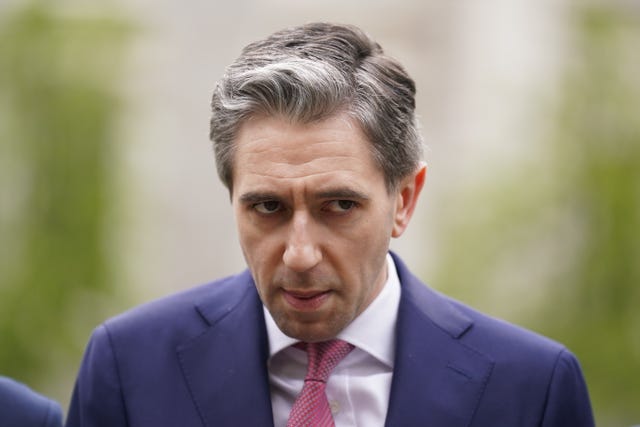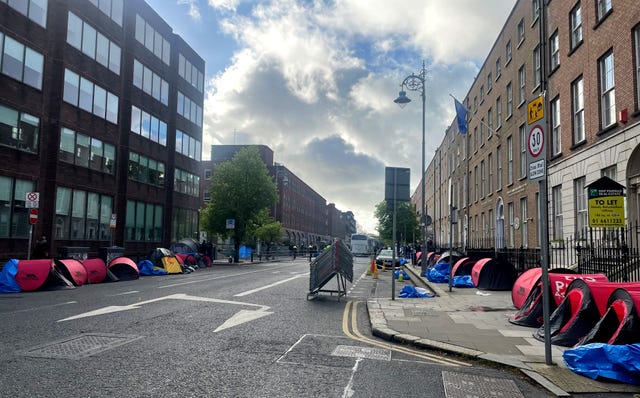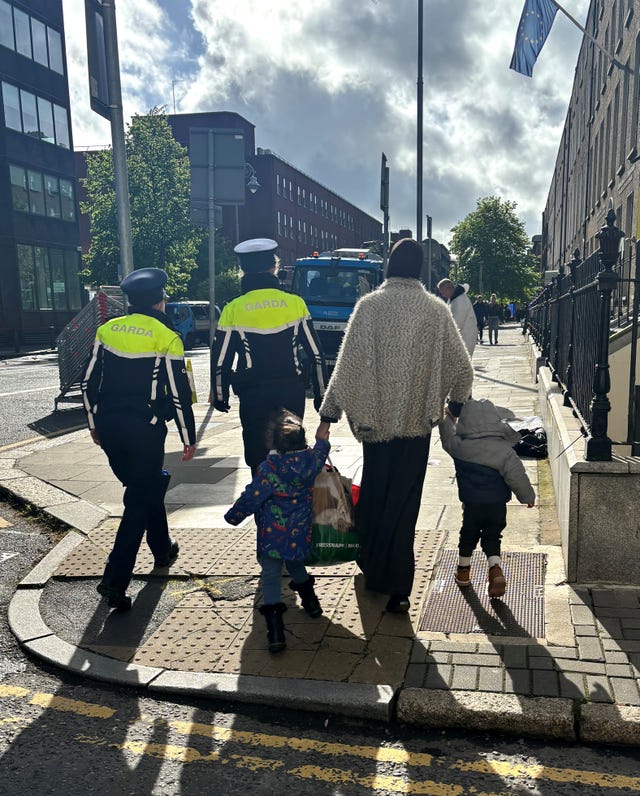At least 285 people have been removed from a makeshift migrant camp in Dublin city centre following a multi-agency operation on Wednesday.
In recent months, migrants have been sleeping rough beside the city’s International Protection Office on Mount Street as the state struggles to source enough accommodation for people seeking asylum.
On Wednesday, the asylum seekers were moved to international protection facilities at the Citywest hotel and at a site at Crooksling in Co Dublin, the Government said.
Taoiseach Simon Harris, who previously compared the scenes to a “shantytown”, thanked the agencies involved in the large operation to relocate the migrants and clear the tents for their “very excellent work”.

Speaking in Dublin, he said: “It was an important day in terms of a humanitarian response to the unacceptable situation people in tents found themselves in on Mount Street.
“It was also an important day for the laws of our land, because this is a country that does have laws, and, as Taoiseach, I expect those laws to be enforced.”
He added: “You can’t have a scenario where in a very ad hoc fashion these kind of tented villages are nearly allowed to develop.
“The operation doesn’t end now and I will expect all of the agency partners to continue to work together to respond and, at what is a difficult, challenging time, to meet the humanitarian needs of people, but also to enforce and uphold the laws of this country.”

The Government said 186 of the international protection applicants took up accommodation at Citywest while 99 were moved to a site in Crooksling.
However, the Government Press Office said in a statement that it understood some applicants did not take up a place at their assigned centre.
It added that it could not provide a timeline on when more appropriate accommodation would become available as it said securing a sufficient number of beds remains a “significant challenge”.
It said barriers had been installed to prevent any further placement of tents around the International Protection Office.
The operation to move the makeshift camp that began early on Wednesday morning came amid increasing diplomatic tensions between the UK and Ireland after the Irish Government expressed concern about an upsurge of asylum seekers entering the country via the land border from Northern Ireland.
Council workers, some dressed in white overalls, were involved in clean-up efforts to remove the tents and wash down the camp area in and around Mount Street.
In a statement, the Government said that the people seeking international protection had been moved safely to the two sites.
A statement said: “The Crooksling site has robust, weather-proof tents.
“It has toilets and showers; health services; indoor areas where food is provided; facilities to charge phones and personal devices; access to transport to and from Dublin City Centre; and 24-hour onsite security.
“While in Crooksling accommodation, residents will receive the same supports as at other locations.
“This includes access to medical care via the HSE social inclusion outreach teams and medical card provision; Ipas customer services team clinics; onsite support from the provider’s staff; and psycho-social and integration support from NGO (non-government organisation) partners.
“The encampment at Mount Street has been dismantled and the streets are being cleaned by Dublin City Council.”

Asylum seekers congregated in groups waiting with their luggage as buses and taxis arrived to take them to another site where basic facilities will be offered.
Mount Street was cordoned off during the operation, with a large number of gardai present.
A similar operation to remove tents from the area was undertaken in March, but another makeshift encampment soon built up again.
Tanaiste Micheal Martin said the operation was to ensure the “safe movement of people” who are seeking asylum.
Mr Martin said: “The tents on Mount Street are not acceptable, not acceptable for migrants and not acceptable for residents living in the area either.”
He added: “The State has, within its powers, the capacity to make sure we don’t have tents back up on Mount Street or other streets and, in our view, the Government is very clear that we can’t have tents in streets adjacent to neighbourhoods.
“It’s not good for those seeking asylum and not good for residents in the area, and it creates a lot of tensions which are not acceptable.
“There is a determination on the Government’s side to use capacity and powers to ensure that it doesn’t occur into the future.”
Irish Labour Party leader Ivana Bacik said the encampment was “inhumane and unsustainable”.
She said the situation demonstrated a “failure” of Government policy on migrant accommodation.
“The conditions on Mount Street for the 200 men who were forced to sleep here in tents had become inhumane and unsustainable,” she told the PA news agency.
“And I did yesterday in the Dail, and indeed on previous occasions, call on the Taoiseach and the Government to address the situation and to find appropriate safe and secure accommodation for the men who are in the tents.
“I’m glad to see that that has been done.
“I will be pressing now to ensure that the accommodation is safe and secure and that it’s appropriate, so that we don’t see this sort of build-up of people living in such desperately unsanitary and unhealthy conditions again on Mount Street or, indeed, anywhere else.”
Noel Wardick, from Dublin City Community Cooperative, an organisation that has been providing support to the asylum seekers sleeping rough, said it was vital that the alternative accommodation was appropriate.
He said that was the key failure of the last removal operation in March.
“The jury is out from the point of view we don’t know where the men are going,” he said.
“And we don’t know the conditions on the site.
“So we would expect that the State has provided sufficient sanitation, water, hygiene, and blankets, warm accommodation.
“However, that wasn’t the case on March 16 when they last dismantled the site in a very shambolic, ham-fisted and chaotic manner.
“So let’s hope all those lessons were learned and the men are in a vastly improved situation.”




Comments: Our rules
We want our comments to be a lively and valuable part of our community - a place where readers can debate and engage with the most important local issues. The ability to comment on our stories is a privilege, not a right, however, and that privilege may be withdrawn if it is abused or misused.
Please report any comments that break our rules.
Read the rules hereLast Updated:
Report this comment Cancel